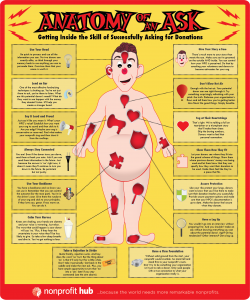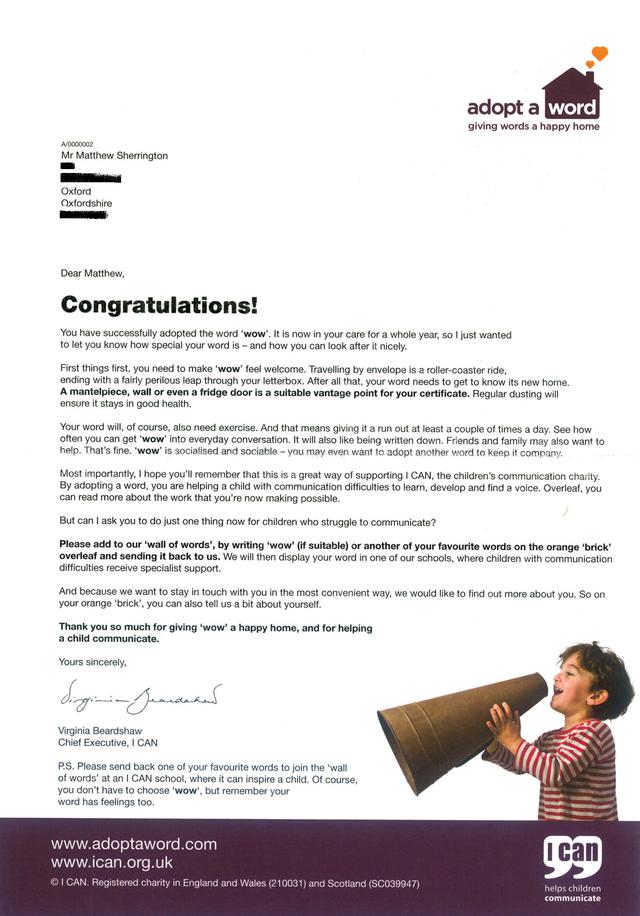Why asking and thanking is all wrong
- Written by
- Matthew Sherrington
- Added
- November 26, 2015

Fundraisers do talk a lot about their donors, relationships, the need (and right) to ask, the importance of saying thank you. The challenge of retention, and the importance of making supporters feel special. But we are sometimes less respectful, even suggesting that people are duplicitous (which is a rather harsh thing to say - we all tell white lies to avoid upsetting people).
Where does this duplicity arise, in saying one thing and doing another? Supporters tell us – in research and in focus groups – they don’t like being asked, they don’t like being phoned, or junk mail, or being stopped on the street. And they tell us they don’t need thank-you letters, so don’t waste your money, thank you very much.
And yet, it all ‘works’. We know that people do need to be asked for them to give. People don’t go out of their way to give spontaneously, however well meaning they are. People do respond, in healthy numbers, to all types of marketing. We know from testing that people do feel warmer towards the organisation and respond better in future when their support has been acknowledged. And we know, as Margaret Mead summed it up, that ‘what people say, what people do, and what they say they do are entirely different things’.
Does this mean we should ignore what people tell us in research? No, of course not. It’s all information. It reflects degrees of disquiet because, after all, who likes the idea of being button-holed by a stranger, cold-called at home, bombarded by junk mail, and seeing charities waste money on useless bits of communication? Put like that, no one. I certainly don’t.

There seems to be a perennial debate about asking and thanking. ‘Always have an ask. ‘Give donors a break’. ‘Give donors the opportunity to give’. And good tips on how to do it. ‘The Anatomy of an Ask’. ‘Always thank them promptly’. ‘What about the relationship?’. It’s not an either/or, of course. Let’s face it, donors don’t really want relationships, but they do respond to being engaged. And it’s true that if you don’t say please you can’t thank; if you don’t thank you won’t please.
But here’s a radical thought. You shouldn’t be asking or thanking donors at all. What exactly is it you think they are doing for you? For YOU?
My 14-year-old daughter was recently moved by an insert that fell out of the weekend papers; ‘God, that’s awful, we should do something to help. It’s only £3’.* And there you have it. Something in the world is awful. Someone is moved to help to put it right and putting it right is what she cares about, what she wants to do, what she wants to know about. People don’t want to think they are making a ‘gift’ and certainly not to you, so thanking them for it is, well, a bit attention seeking.
What is it, then, that we are getting wrong? Charities are just not doing a good enough job talking up the great work they help make happen. The amazing difference people can make to others by supporting them. They don’t tell enough of the stories of heroism and hope in the face of unbelievable adversity, that they have the privilege to encounter, every day. If there’s nothing in the message, the messenger is going to be irrelevant and an irritation. Of course people will shoot him.
So forget about asking. Think instead about offering – offering the opportunity to people to do something amazing for others. And forget about thanking. Think instead about congratulating people for the difference they are making, what they have achieved. Don’t be grateful, be humble: our job as a charity is to help people do their good in the world. Not the other way around.
This simple thought will give you the discipline to actually work out what difference your supporters have made and tell them that, rather than focus on the transactional gift, from them to you. Once you’ve got that frame of mind straight, once you’re in awe of supporters for the wonders they do in the world, then you should pay close attention to the craft of how to write that particular letter. A couple of great blogs that cover the essentials of writing a thank-you letter are Richard Turner’s and Katya Andresen’s (well, apart from her point six!) Thank you? Congratulations? Semantics. You get the idea.
Readers, millions of people know they are changing the world because of you. You are AWESOME!
*(Well done Sightsavers! Though she doesn’t know or care that it’s you, obvs.)


















